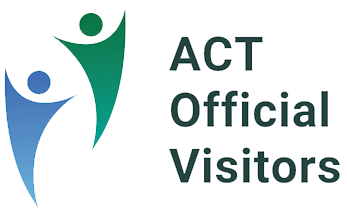ACT Official Visitors provides independent oversight and helps safeguard the rights and wellbeing of people of diverse backgrounds in Canberra who reside in and rely on services provided in government and non-government facilities, accommodation, housing, centres, or refuges.
Official Visitors are independent statutory office holders who can visit visitable places and meet entitled persons to identify and monitor systemic issues and resolve grievances using early intervention and resolution practices. The Official Visitor reports to the relevant Operational Minister and advises on entitled peoples’ experiences, needs and the standard of the services they receive.
Official Visitors are appointed to one of these areas:
- Children and Young People - youth detention facility (Bimberi Youth Justice Centre) and places of residential care for children and young people
- Corrections - adult correctional centre (Alexander Maconochie Centre)
- Disability - supported accommodation for people with disabilities
- Mental Health - mental health facilities (such as Adult Mental Health Unit) / community housing
- Homelessness – homelessness services.
The following generic powers apply to all Official Visitors in the ACT. Further powers apply to specific Official Visitors under individual Operational Acts.
Primary functions of an Official Visitor
- Visit 'visitable places' as defined in Operational Acts
- Report to the Minister on non-compliant places, and any complaints raised
- Receive/consider complaints from 'entitled persons' and others on their behalf
- Complaints taken must be related to the 'visitable place'
- Be available to talk to entitled persons or persons with concerns about an entitled person
- Exercise any other function under the relevant operational Act
Powers of an Official Visitor
- Attend a visitable place at any time following a raised complaint, or at their own initiative
- Access any health or other record relating to an entitled person with their written or oral consent
- Access records without an entitled persons permission if that entitled person is not able to make a decision about consent or communicate that decision, and the Official Visitor believes it is important to still access that record to exercise their functions
- Access any record required to be kept under the Operational Act
- Other powers as specific to the Operational Acts
Requirements of a visitable place
- Notify an Official Visitor as soon as possible, but no later than 24 hours of any request by an entitled person to speak with an Official Visitor
- An entitled person cannot be asked why, nor do they need to provide details on why they want to speak with an Official Visitor
- Persons may request to speak with an Official Visitor of a specific gender, and to speak with an Official Visitor with no-one else present in a private place
- Provide all reasonable assistance to the Official Visitor that they ask for to exercise their functions, including answering all questions asked
- Keep a register of each visit by an Official Visitor
- Provide information to all entitled persons on the functions of the Official Visitor, and how they may be contacted
- Provide to an entitled person, no later than when they first enter the visitable place, details about how they can complain to the Official Visitors in an accessible way
- It is an offence to:
- refuse and or neglect to render an Official Visitor assistance if asked
- fail to answer any questions if asked by an Official Visitor in the exercise of their functions
- obstruct or hinder an Official Visitor during the exercise of their functions
- fail to keep a record of every visit by an Official Visitor
Further specific powers contained in Operational Acts
| Children and Young People Act 2008 |
|
| Disability Services Act 1991 |
|
| Housing Assistance Act 2007 |
|
| Mental Health Act 2015 |
|
| Corrections Management Act 2007 |
|
For further information or to arrange a visit, please contact the Official Visitor hotline on 1800 150 036.
For administrative matters including the Official Visitors Board, contact the Executive Officer, ACT Official Visitors by calling 02 6207 0978, emailing ovs@act.gov.au, or by using our contact form.
If you are concerned about your own safety, or the safety of someone else, you should contact the police on 000.
If you are concerned about the safety of a child or young person, you should contact ACT Community Services (Child and Youth Protection) on 1300 556 729 (business hours) or 1300 556 728 (after hours).
You can also contact the ACT Human Rights Commission on (02) 6205 2222 to make a complaint in respect to services for:
- children and young people to the Children and Young People Commissioner;
- health services and services for older people to the Health Services Commissioner; or
- disability services to the Disability and Community Services Commissioner.
The Public Advocate may also be able to assist with concerns you may have about your contact with Child and Youth Protection Services, the mental health system or disability services. If you would like to discuss your concern with the Public Advocate, please call 02 6205 2222 between 9:00am to 5:00pm Monday to Friday or email PublicAdvocateReferrals@act.gov.au.
Related links
